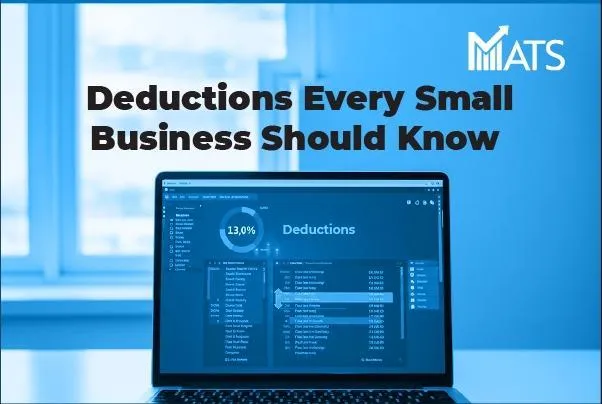Read Our Latest Blogs
Our blog is dedicated to providing Atlanta business owners with valuable insights, expert tips, and the latest updates on tax preparation, planning, and compliance. Whether you're looking to catch up on overdue filings, navigate complex tax laws, or simply stay informed about best practices, you'll find the resources you need right here. Dive into our articles and discover how proactive tax management can benefit your business and help you achieve financial success.
Join Our Email List

Tax Deductions Every Small Business Should Know
Introduction
Running a small business means juggling a lot—sales, staff, strategy, and yes, taxes. However, one of the most overlooked opportunities to save money is understanding the tax deductions for small businesses. These aren't loopholes or tricks; they're legitimate ways to lower your tax bill and keep more money in your business's pocket. Yet, many small business owners either miss out on them entirely or don't claim the full amount.
In this comprehensive guide, we'll walk you through the most important small business tax deductions, how to qualify, how to keep clean records, and which tools like Keeper Tax and Expensify can help you stay on track.
📥 Call to Action: Ready to stop leaving money on the table? Download your Tax Deduction Cheatsheet and make sure you're claiming everything you're entitled to.
1. What Are Tax Deductions?
Tax deductions are expenses that reduce your taxable income. For example, if your business earns $100,000 and you have $30,000 in deductible expenses, you'll only pay tax on $70,000. The IRS allows you to deduct any "ordinary and necessary" expenses related to running your business. Understanding what qualifies is key to saving money legally and strategically.
2. Why Tax Deductions Matter for Small Businesses
Every dollar deducted from your taxable income saves you money. If you're in the 24% tax bracket, then a $1,000 deduction could save you $240. Multiply that by every category you can deduct, and the savings add up quickly. In a high-cost business environment, smart tax planning is a competitive advantage.
Example:
Let's say you deduct $15,000 worth of expenses in a year. If you're taxed at 24%, you'll save $3,600. That money can be reinvested into hiring, marketing, or paying down debt.
3. Most Common Tax Deductions for Small Businesses
These deductions apply to most industries and are widely accepted by the IRS:
a. Home Office Deduction
If you work from home, you can deduct a portion of your rent or mortgage, utilities, internet, and other expenses. You can calculate this using the simplified method ($5 per square foot up to 300 sq ft) or the regular method based on actual expenses.
b. Business Use of Car
If you use your vehicle for business purposes, you can deduct mileage (65.5 cents/mile for 2023), gas, maintenance, and insurance. Keep a mileage log or use a tracking app.
c. Office Supplies & Equipment
Paper, pens, ink, laptops, and printers—if you use them for business, they are deductible.
d. Travel Expenses
Flights, hotels, meals (50% deductible), taxis, and parking during business trips are deductible. Just make sure you have a clear business purpose.
e. Meals & Entertainment
You can deduct 50% of qualifying business meals. Meals with clients, employees, or during business travel all qualify. Entertainment is no longer deductible under current tax law, though meals associated with entertainment may be.
f. Marketing & Advertising
Everything from Facebook ads to business cards to your website hosting costs is deductible.
g. Software Subscriptions
Services like Keeper Tax, Expensify, QuickBooks, and CRMs all qualify.
h. Contract Labor
Paying freelancers or independent contractors? You can deduct those costs fully.

4. Hidden Deductions You Might Be Missing
a. Bank Fees and Credit Card Interest
Fees for business banking and credit card interest (on business purchases) are deductible.
b. Business Insurance
Liability insurance, E&O insurance, cyber liability, and even some health plans can be deducted.
c. Education and Training
Courses, webinars, books, and certifications that directly relate to your business are fair game.
d. Business Gifts
Gifts are deductible up to $25 per recipient per year.
e. Depreciation of Assets
Big-ticket items like furniture and machinery can be deducted over time.
5. How to Stay Audit-Proof
Deductions are great—unless you get audited and can't back them up. The IRS looks for patterns and red flags, such as excessive deductions, when compared to revenue.
Tips:
Keep receipts for everything.
Use software to track expenses and categorize them.
Don't commingle personal and business finances (more on that in our "Separate Personal and Business Finances" guide).
6. Tools to Simplify Tracking: Keeper Tax & Expensify
Keeper Tax
This smart app scans your bank transactions and suggests deductions automatically. It's perfect for freelancers and self-employed business owners who want to minimize accounting costs. If you opt in, it even files your taxes.
Try Keeper Tax to uncover deductions you may not even know you're missing.
Expensify
Ideal for businesses with employees or frequent travelers, Expensify helps you snap photos of receipts, track mileage, and submit expense reports. It also integrates with QuickBooks, Xero, and more.
Use Expensify to simplify receipt tracking and mileage logging.
7. Recordkeeping Best Practices
The IRS recommends keeping records for at least 3 years. Digital records are acceptable, so scan and organize everything.
Best Practices:
Use a business-only bank account and credit card.
Categorize your transactions weekly.
Back up digital receipts in Google Drive or Dropbox.
Use software like QuickBooks or Wave for double-entry bookkeeping.
Need help organizing your system? Read our Bookkeeping Cleanup Guide.
8. When to Hire a Professional
DIY is fine when you're starting, but a tax professional becomes essential as your business grows.
Signs you need help:
You don't understand your quarterly tax estimates.
You've received IRS letters.
You run the payroll.
You're unsure how to handle depreciation or amortization.
A CPA or enrolled agent can help you save more than their fee.
9. Special Considerations for Freelancers and Virtual Assistants
Freelancers and VAs often miss deductions because their income is irregular, or they're just starting. Here's what you should pay attention to:
Co-working space memberships
Internet and phone bills
Office furniture and ergonomic tools
Professional subscriptions and dues
Client software like CRMs
Check out our Virtual Assistant Guide to Tax Deductions for a tailored breakdown.
10. Final Thoughts: Don't Leave Money on the Table
You work hard for your business—don't give away more to the IRS than you have to. By understanding the full range of tax deductions for small businesses, you can protect your profits and plan more confidently for the future.
Start tracking your deductions today with tools like Keeper Tax and Expensify. Learn the Importance of Separating Personal and Business Finances, and get help from a tax pro if needed.
📥 Download your free Tax Deduction Cheatsheet and make sure you're getting every deduction you deserve.

Hear What Our Clients Say
See Our Google Reviews

George Owens

MATS did such a great job on my taxes! This was my first year filing as a real estate agent and they were quick, efficient, personable and worked throughout the weekend to make sure I met the tax deadline. It was an easy process of filing with a simple app and I saved thousands on my tax bil

Max Tanner

I’ve been a happy client of Madison’s Accounting and Tax services for about 3 years now. They have not only done an excellent job of handling my taxes, as I have several businesses, they have increased my tax knowledge as well. I love that as my business continues to grow they are constantly working to keep my finances straight in a creative yet compliant way. I highly recommend.

Kim Wexler

MATS allowed me to make informed decisions and optimize my return, while enlightening me on how I can improve my outcome for the upcoming tax year. I am satisfied and I am excited to continue working with this awesome business.

Billy Jackson

MATS has supported our taxes for a few years and consistently delivers in a timely manner. They take the weight of intricate filing of several forms off your shoulders. We appreciate their timely communication and care for their customers.


© 2025 Madison's Accounting & Tax Services LLC - All Rights Reserved. Terms of Service | Privacy Policy
470-665-5503

